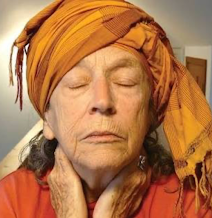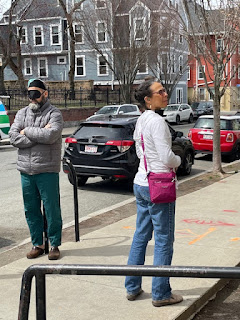PANDEMIC LAUGHTER YOGA
I teach people to laugh. That's not really true. I only had one student who did not laugh until he came to my class. What I really do is lead laughter classes where we sometimes laugh for forty-five minutes straight. That sounds like a lot of laughing, and it is; however, I swim for forty-five minutes, do aerobics or go for a walk for that much time. We need to look at laughing, or Laughter Yoga, as an exercise or a practice like regular Yoga but more fun.
In 2006 I went to a wedding in Lebanon, while there a war ensued. I returned home with PTSD. My daughter said, "Do Laughter Yoga! Google it." At that time, I couldn't find any classes in my area, so I dragged my daughter to India, where the Laughter Yoga guru, Dr. Madan Kataria, was teaching a ten-day meditation and Laughter Yoga workshop. At first, I thought laughing with a group of people from all over the world was a money-making scheme for Dr. Kataria. After three days of fake and obnoxious laughing on my part, thanks to the PTSD, I finally surrendered to laughing fully and went home without PTSD. Once home, I started teaching people to laugh for no reason at all. I am the first person in this country to teach Laughter Yoga in a prison. I have also taught people who recently lost their spouses in Hospice Care, children with incarcerated parents, homeless groups, men who have experienced strokes, retired nuns, and in Ecuador with a translator!
In 2016 I offered a free Laughter Yoga class open to anyone, at the local Y, on Inauguration Day. About fifteen people arrived with their heads low and sad expressions on their faces. This was not the first time I'd had a challenging audience. At the convent, the old nuns (one was celebrating her 100th birthday that day) were rolled into the room in their wheelchairs, and I thought I was going to have to put on a show instead of leading an interactive laughter session. By the end of class, the nuns were all rosy-cheeked and smiling, begging me to return soon again. On Inauguration Day, it seemed the challenge was more complex, and I was determined not to make it a political event. "We can do this!" was my motto. After laughing for forty-five minutes with a ten-minute quiet meditation, I went around the circle of participants to find out how everyone felt. They were all smiling, much different than when they entered the room; all of them felt relief and knew that they could "Do this!
Responses I have heard, over the years, from students have been uplifting. One man, whose wife had recently died told me that he felt the whole world had been lifted off his shoulders; a new widow said that she was going home to decorate her Christmas tree, that she'd had no intention of decorating. Now, during the pandemic, I have been leading a Zoom laughter group five days a week since mid-March. I like to say we have an international group because there are people who come from Australia, Sweden, Turkey, and Ireland! Sometimes we have twelve or fifteen people all laughing on their screens. We make up different laughing exercises and even do a few minutes of meditation at the end. Everyone is welcome, including children and dogs, and it's free. My students say I have saved their lives; I feel they have saved mine.
STRESS RELIEF FROM LAUGHTER? IT'S NO JOKE.
When it comes to relieving stress, more giggles and guffaws are just what the doctor ordered. Here's why.
Whether you're guffawing at a sitcom on TV or quietly giggling at a newspaper cartoon, laughing does you good. Laughter is a great form of stress relief, and that's no joke.
Stress relief from laughter
A good sense of humor can't cure all ailments, but data is mounting about the positive things laughter can do.
Short-term benefits
A good laugh has great short-term effects. When you start to laugh, it doesn't just lighten your load mentally, it actually induces physical changes in your body. Laughter can:
- Stimulate many organs. Laughter enhances your intake of oxygen-rich air, stimulates your heart, lungs and muscles, and increases the endorphins that are released by your brain.
- Activate and relieve your stress response. A rollicking laugh fires up and then cools down your stress response, and it can increase and then decrease your heart rate and blood pressure. The result? A good, relaxed feeling.
- Soothe tension. Laughter can also stimulate circulation and aid muscle relaxation, both of which can help reduce some of the physical symptoms of stress.
Long-term effects
Laughter isn't just a quick pick-me-up, though. It's also good for you over the long term. Laughter may:
- Improve your immune system. Negative thoughts manifest into chemical reactions that can affect your body by bringing more stress into your system and decreasing your immunity. By contrast, positive thoughts can actually release neuropeptides that help fight stress and potentially more-serious illnesses.
- Relieve pain. Laughter may ease pain by causing the body to produce its own natural painkillers.
- Increase personal satisfaction. Laughter can also make it easier to cope with difficult situations. It also helps you connect with other people.
- Improve your mood. Many people experience depression, sometimes due to chronic illnesses. Laughter can help lessen your depression and anxiety and may make you feel happier.
Improve your sense of humor
Are you afraid you have an underdeveloped — or nonexistent — sense of humor? No problem. Humor can be learned. In fact, developing or refining your sense of humor may be easier than you think.
- Put humor on your horizon. Find a few simple items, such as photos, greeting cards or comic strips, that make you chuckle. Then hang them up at home or in your office. Keep funny movies, books, magazines or comedy videos on hand for when you need an added humor boost. Look online at joke websites. Go to a comedy club.
- Laugh and the world laughs with you. Find a way to laugh about your own situations and watch your stress begin to fade away. Even if it feels forced at first, practice laughing. It does your body good.
Consider trying laughter yoga. In laughter yoga, people practice laughter as a group. Laughter is forced at first, but it can soon turn into spontaneous laughter.
- Share a laugh. Make it a habit to spend time with friends who make you laugh. And then return the favor by sharing funny stories or jokes with those around you.
- Knock, knock. Browse through your local bookstore or library's selection of joke books and add a few jokes to your list that you can share with friends.
- Know what isn't funny. Don't laugh at the expense of others. Some forms of humor aren't appropriate. Use your best judgment to discern a good joke from a bad or hurtful one.
Laughter is the best medicine
Go ahead and give it a try. Turn the corners of your mouth up into a smile and then give a laugh, even if it feels a little forced. Once you've had your chuckle, take stock of how you're feeling. Are your muscles a little less tense? Do you feel more relaxed or buoyant? That's the natural wonder of laughing at work.

















Comments
Post a Comment